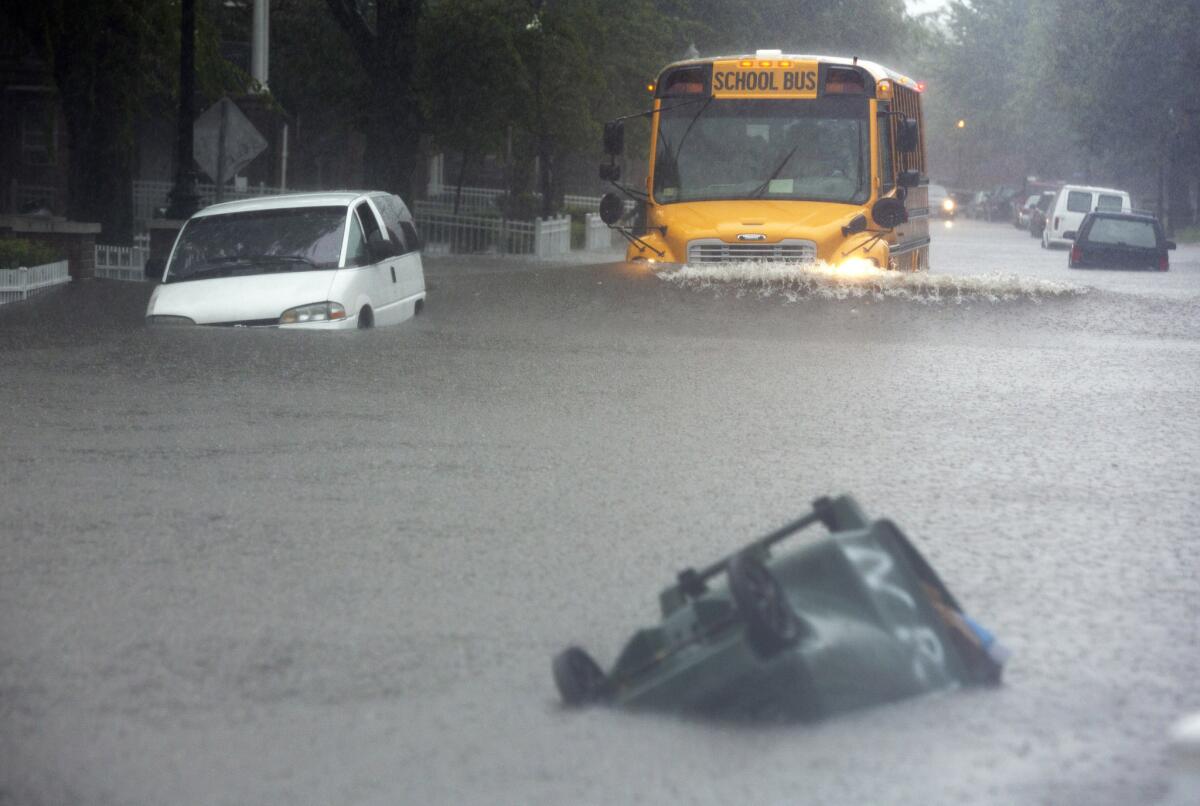U.N. climate agency reports carbon dioxide growing at alarming rate

Catastrophic weather events are increasing around the world, like the flooding that hit Norfolk, Va., on Monday. Scientists blame the disasters on climate change caused by rising greenhouse gas concentrations.
- Share via
Carbon dioxide accumulation in the atmosphere reached a record high last year and grew at the fastest rate in 30 years, the United Nations’ climate agency reported Tuesday.
The World Meteorological Organization’s latest Greenhouse Gas Bulletin “injected even greater urgency into the need for concerted international action against accelerating and potentially devastating climate change,” the U.N. agency said.
“We know without any doubt that our climate is changing and our weather is becoming more extreme due to human activities such as the burning of fossil fuels,” said WMO Secretary-General Michel Jarraud in Geneva.
The bulletin compiles assessments of annual concentration of the three most enduring greenhouse gases -- carbon dioxide, methane and nitrous oxide -- which are blamed for 88% of the increase in global temperature, WMO said.
Jarraud called for developed and developing countries to commit to a binding formula for reducing emissions and limiting global warming to 3.6 degrees Fahrenheit over the preindustrial global temperature, calculated as that in 1750.
The concentration of heat-trapping carbon dioxide increased last year by 2.9 ppm, or parts per million, to 396 ppm, the biggest annual increase since 1984, WMO said. Some climate scientists believe concentrations below 350 ppm to be relatively safe, but that is a level not seen since 1987.
The agency’s bulletin included a report on the greenhouse gas emissions’ effect on ocean quality for the first time. The oceans “cushion” the impact of carbon in the atmosphere by absorbing about a quarter of the worldwide emissions, the report said, but with alarming consequences for the water.
“The current rate of ocean acidification appears unprecedented at least over the last 300 million years,” the bulletin stated.
Wendy Watson-Wright, executive secretary of UNESCO’s Intergovernmental Oceanographic Commission, warned that time is running out in the mission to prevent devastating climate change.
“It is high time the ocean, as the primary driver of the planet’s climate and attenuator of climate change, becomes a central part of climate change discussions,” said Watson-Wright.
The oceans take up about 8.8 pounds of carbon dioxide per person per day, the report said. Increased acidification alters “calcifying organisms” like coral, mollusks and algae and reduces the survival and growth rates of other aquatic species, the bulletin noted.
Follow @cjwilliamslat for the latest international news 24/7
More to Read
Sign up for Essential California
The most important California stories and recommendations in your inbox every morning.
You may occasionally receive promotional content from the Los Angeles Times.














